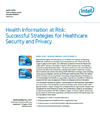
This whitepaper describes an industry-standard approach that healthcare organizations can use to assess risks and identify security and privacy needs. We also share a multilayered, defense-in-depth strategy that can help healthcare organizations mitigate risks throughout the threat lifecycle to protect the confidentiality, integrity, and availability of sensitive information. With this foundation in place, we discuss specific security and privacy needs for healthcare organizations and describe several Intel® technologies that can help address these needs:
- Mitigating loss or theft of sensitive information
- Protecting sensitive information at rest, in transit and in use
- Protecting access to sensitive information with strong authentication
- Improving security and privacy policy compliance
Download Successful Strategies for Healthcare Security & Privacy (.pdf, 452 KB).
Download from eHealthNews.eu Portal's mirror: Successful Strategies for Healthcare Security & Privacy (.pdf, 452 KB).